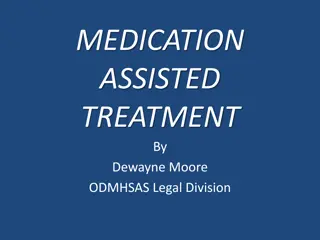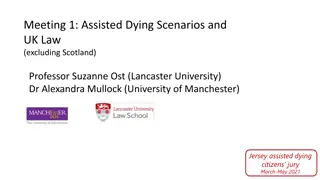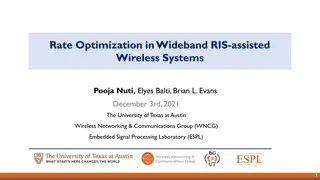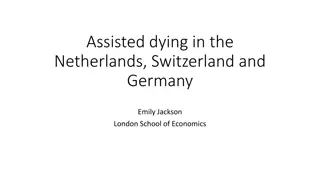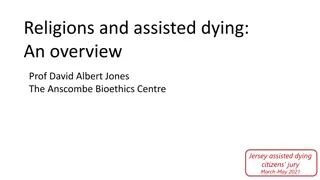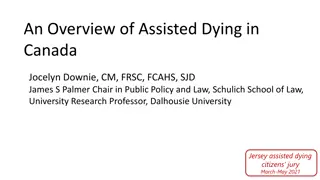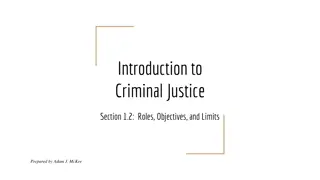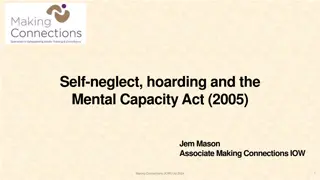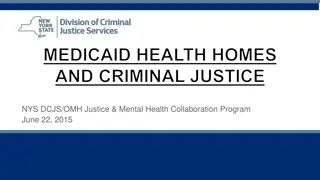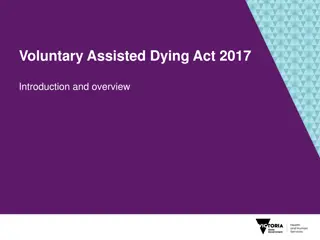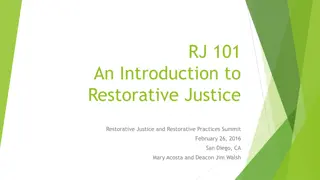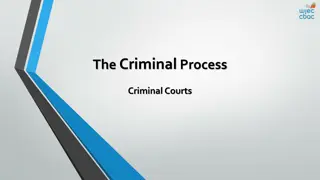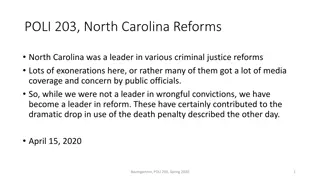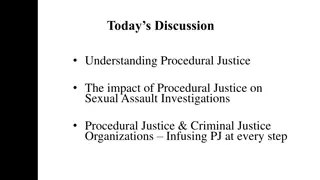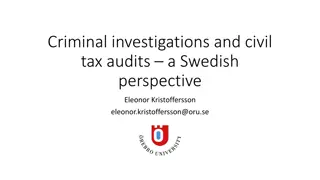The Assisted Decision-Making (Capacity) Act 2015 in the Criminal Justice Context
The Assisted Decision-Making (Capacity) Act 2015 introduces key reforms such as the abolition of wards of court system for adults, a statutory functional test of capacity, new guiding principles, a three-tier framework for support, and tools for advance planning. It emphasizes functional assessment of capacity and guiding principles like presumption of capacity and dignity. Categories of decisions include property, personal welfare, and more. The Act establishes the Decision Support Service and outlines the roles of decision-making representatives, co-decision makers, and decision-making assistants.
Download Presentation

Please find below an Image/Link to download the presentation.
The content on the website is provided AS IS for your information and personal use only. It may not be sold, licensed, or shared on other websites without obtaining consent from the author. Download presentation by click this link. If you encounter any issues during the download, it is possible that the publisher has removed the file from their server.
E N D
Presentation Transcript
The Assisted Decision-Making (Capacity) Act 2015: the Criminal Justice Context ine Flynn, Director of the Decision Support Service
An Act to provide for the reform of the law relating to persons who require or may require assistance in exercising their decision-making, whether immediately or in the future Signed into law 30th December 2015 Not yet fully commenced 200, 000 people potentially affected
Key Reforms Abolition of wards of court system for adults Statutory functional test of capacity New guiding principles Three-tier framework for support New tools for advance planning Establishment of Decision Support Service
Functional Assessment of Capacity No diagnostic criteria With limited exceptions, the Act is not prescriptive or exhaustive about who may assess capacity A person lacks capacity if unable to: understand; retain; weigh up information; communicate a decision, with appropriate assistance if necessary
Guiding Principles Including: presumption of capacity support person to make own decisions as far as possible right to be unwise dignity, bodily integrity, privacy, autonomy give effect to will and preferences act in good faith and for the benefit of the person
Categories of Decisions Property and affairs management of property carrying on business discharging debts and liabilities providing for other persons applying for benefits conduct of proceedings before any court or tribunal Personal Welfare accommodation education and training social services healthcare other matters relating to the person s well-being 7
New Three-Tier Framework Decision-Making Representative Last resort Co-Decision Maker Court-appointed Makes specified decisions jointly with the person Makes decisions as agent for the person as provided in court order Decision-Making Assistant Helps access and explain information Person still makes the decision
Advance Planning Expanded enduring power of attorney Statutory advance healthcare directive to provide legally binding advance refusal of treatment
Interface between the Act and criminal justice The Act creates a number of new offences: use of fraud, coercion or undue influence to force a person to enter into a decision support arrangement includes leading a person to believe that this is necessary to secure residential care submission of false information in connection with arrangements ill-treatment or wilful neglect by a decision supporter penalties up to 50,000 fine/ 5 years imprisonment
Advance Healthcare Directives: criminal liability No change to the law on murder, manslaughter or assisted suicide No civil or criminal liability for a healthcare professional who: complies with AHD, reasonably believing it valid/applicable does not comply with refusal of treatment, reasonably believing AHD is not valid/applicable does not know about AHD or cannot obtain it and treatment cannot be delayed Existing law affecting liability is otherwise unaffected
Advance Healthcare Directives: Criminal Law (Insanity) Act 2006 exception If a person is being treated under Part 4 Mental Health Act 2001 or conditionally discharged under the 2006 Act, then AHD is not binding if it relates to refusal of treatment for mental disorder Amending Bill 2019 proposed to amend this exception but to retain it in 2006 Act cases
Capacity and Consent: specific exclusions in criminal justice The Act does not affect the law in relation to consent to sexual relations Criminal Law (Sexual Offences) Act 2017 definition: due to mental illness, mental disability or intellectual disability incapable of understanding, evaluating, communicating consent creates category of protected persons and offences
Capacity and Consent: specific exclusions in criminal justice (cont.) The Act does not affect the law in relation to serving as a member of a jury Juries Act 1976: incapable persons includes persons with mental illness or mental disability receiving treatment Disability (Miscellaneous Provisions) Bill 2016 proposed amended definition: A person who does not, in the opinion of the court, possess the decision-making capacity to exercise the functions of a member of a jury.
Act is not otherwise disapplied in criminal justice Across policing, courts, prison system: ensure appropriate standards and principles accessibility of information/appropriate communication tools access to the supports under the Act accommodation of new support arrangements equivalence and continuity of care Aligns to Article 13: equal and effective access to justice
Preparations for commencement Decision Support Service is liaising with Garda National Protective Services Bureau Director s duties: promote awareness of the 2015 Act and UNCRPD provide guidance and information to state bodies and organisations publish codes of practice publish our internal complaints and investigations processes Article 13: broader training requirement in criminal justice sector
Thank You www.decisionsupportservice.ie This presentation is intended as an overview of certain parts of the Assisted Decision-Making (Capacity) Act 2015 and related matters and should not be relied on as legal advice or opinion



